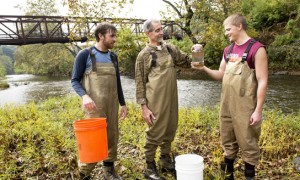Commentary by Tammara Belinsky, Roanoke Times, July 16, 2019
Today a public servant questioned my description of the ongoing construction of the Mountain Valley Pipeline as lawless. Here’s an accounting.
First, the Fourth Circuit Court of Appeals vacated the two federal agency decisions to build the pipeline in the Jefferson National Forest. Another Fourth Circuit decision on the Atlantic Coast Pipeline created an additional barrier for MVP by denying authority to cross the Appalachian Trail. After the Fourth Circuit vacated the Corps of Engineers stream crossing authorization in West Virginia, the Corps itself suspended the same authorization in Virginia.
These permits are each and all prerequisites for the FERC certificate, and yet FERC allows construction to continue. MVP, LLC also has been sued by the Commonwealth of Virginia for violating numerous conditions of the certification that was intended to protect water resources.
Now the U.S. Fish and Wildlife Service (“the Service”) admits that it lacked vital information when it issued the Biological Opinion and Incidental Take Statement (“BO”) that regulates impacts to endangered species. Perhaps the only reason for this late admission is the scathing analysis it received in October 2018 from Virginia Tech professor Paul Angermeier, the pre-eminent expert on the Roanoke Logperch. The endangered fish has been subject to 30 years of recovery-plan implementation, all funded by taxpayers.
Dr. Angermeier’s letter reveals that he “did not see (and was not asked to review) the BO before it was submitted” to FERC. The “recent renewed scrutiny of MVP environmental impacts, including some permits being vacated and/or revised” prompted him to review the Biological Opinion and identify “several important shortcomings” that he “believe[s] led to significant underestimates of potential MVP impacts on” the Roanoke Logperch. “Excess fine sediment probably adversely affects all RLP life stages, including eggs, larvae, juveniles, adults, and spawners.”
Not only does the BO underestimate the number of Roanoke Logperch killed, according to Angermeier, the BO “does not require…a monitoring protocol that can provide scientifically creditable estimates” of actual deaths caused by construction. Dr. Angermeier’s seven-page, single-spaced analysis also criticizes the lack of proof that the erosion and sediment controls can be effective — a failure also central to the court’s vacating of the national forest permit. On the heels of Dr. Angermeier’s letter, the Service alerted FERC that, in addition to concerns about the Roanoke Logperch, the Service has insufficient data regarding three additional species, including the newly listed candy darter, to comply with federal law.
In response to Dr. Angermeier’s letter, FERC and the Service are each and both required to reopen consideration of the Biological Opinion. According to federal regulation, “Reinitiation of formal consultation is required and shall be requested by the Federal agency or by the Service” if “new information reveals effects…that may affect listed species …in a manner or to an extent not previously considered” or if a new species that may be affected by construction is added to the endangered species list. (50 CFR § 402.16).
The Commonwealth of Virginia claims that MVP’s ongoing construction is out of its hands, but Virginia has both the duty and the authority to protect endangered species. The Department of Game and Inland Fisheries is responsible for enforcement of the ESA in Virginia. The DEQ and the Water Control Board are charged with the protection of Virginians’ beneficial uses of streams — of which we are robbed when the ecological health of streams is impaired. The Commonwealth must insist that FERC and the Service abide by the law.
Secretary of Natural Resources Matt Strickler should ask FERC to reinitiate consultation under the Endangered Species Act in the interest of Virginia’s natural heritage and should direct DEQ to suspend and reevaluate MVPs failing erosion and sediment control plans.
Senators Tim Kaine and Mark Warner, as guardians of the federal process and its accountability to the Virginians they serve, should ask both FERC and the Service to reinitiate consultation under the ESA.
Construction of the Mountain Valley Pipeline continues to harm our natural heritage and endanger species that are irreplaceable and crucial to ecological health on which Virginians depend. The willingness among decision makers, policy makers, and law makers to risk the extinction of an entire species while also threatening our own water resources seems a slippery slope.
The Service’s information needs are extensive and long overdue. All of the impacts to the species named in the Service’s letter must be properly assessed. The required assessment will take considerable time and will be meaningless unless construction stops while FERC and the Service re-initiate formal consultation under the Endangered Species Act.

